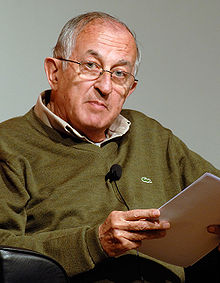Background
Juan Goytisolo was born to an upper class family. He claimed that this level of status, accompanied by the cruelties of his great-grandfather and the miserliness of his grandfather (discovered through the reading of old family letters and documents), was a major reason for his joining the Communist party in his youth. [3] His father was imprisoned by the Republican government during the Spanish Civil War, while his mother, Julia Gay, was killed in the first Francoist air raid of Barcelona in 1938. [4] He attended a Jesuit school in Barcelona after the Civil War, where he began writing fiction as a teenager. He later attended law school at the University of Madrid and the University of Barcelona, but left without earning a degree. [5]
Career
After law studies, Goytisolo published his first novel, The Young Assassins, in 1954. In 1956 he performed six months of military service in Mataró, which inspired some of his early stories. His deep opposition to Francisco Franco led him into exile in Paris later that same year, where he worked as a reader for Gallimard. In the early 1960s, he was a friend of Guy Debord. From 1969 to 1975 he worked as a literature professor in universities in California, Boston, and New York. Breaking with the realism of his earlier novels, he published Marks of Identity (1966), Count Julian (1970), and Juan the Landless (1975). During his tenure as a professor he also worked on his controversial Spanish translation of the works of José María Blanco White, which he published in part as a critique of Francoist Spain. As with all his works, they were banned in Spain until after Franco's death.
In 2012, Goytisolo confirmed that he was finished writing novels, saying he had nothing more to write and that it was better he kept quiet. He continued, however, to publish essays and some poetry. [6]
Count Julian (1970, 1971, 1974) takes up, in an act of outspoken defiance, the side of Julian, count of Ceuta, a man traditionally castigated as the ultimate traitor in Spanish history. In Goytisolo's own words, he imagines "the destruction of Spanish mythology, its Catholicism and nationalism, in a literary attack on traditional Spain." He identifies himself "with the great traitor who opened the door to Arab invasion." The narrator in this novel, an exile in North Africa, rages against his beloved Spain, forming an obsessive identification with the fabled Count Julian, dreaming that, in a future invasion, the ethos and myths central to Hispanic identity will be totally destroyed.
Family
Goytisolo was married to the publisher, novelist and screenwriter Monique Lange [ es ], whom he met in Paris in the 1950s. Lange was related to Emmanuel Berl and the philosopher Henri Bergson. [7] Goytisolo and Lange had something of an open relationship, and he slept with men but "love[d] only Monique". [8] They married in 1978 and lived together until she died in 1996. After her death, he was noted as saying their once-shared Paris apartment had become like a tomb. In 1997 he moved to Marrakesh, where he died in 2017.
His brothers José Agustín Goytisolo (1928–1999) and Luis Goytisolo (1935) were also writers. [9]
This page is based on this
Wikipedia article Text is available under the
CC BY-SA 4.0 license; additional terms may apply.
Images, videos and audio are available under their respective licenses.
